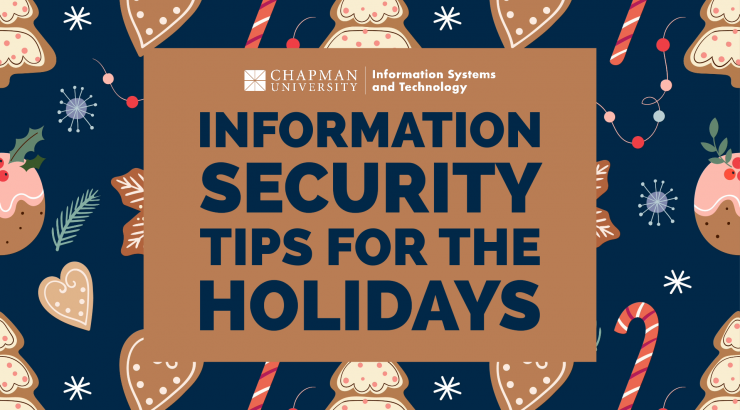
Information Security Tips for the Holiday Season
November 6, 2023
The holiday season is a time for celebration, giving, and spending quality time with loved ones. However, amidst all the festivities, it’s crucial not to let your guard down when it comes to information security. Cybercriminals are always looking for opportunities to exploit vulnerabilities, and the holidays can be a prime target.
Ensure your online safety during the holiday season with our comprehensive guide. In this blog, we will discuss how to protect your devices, secure your accounts, and guard against common online threats. From updating your devices to educating your family about information security, these 10 tips are essential for a stress-free and secure holiday experience. Don’t let cyber threats dampen your holiday spirit—stay safe and enjoy the festivities with confidence.
- Update Your Devices: Make sure all your devices are up to date. This includes smartphones, tablets, laptops, and even smart home gadgets. Manufacturers release software updates to patch security vulnerabilities, so keeping your devices current is a fundamental step in maintaining digital safety.
- Use Strong, Unique Passwords: One of the simplest yet most effective ways to protect your online accounts is by using strong and unique passwords. Avoid using easily guessable passwords like “123456” or “password.” Instead, opt for long, complex passwords or consider using a password manager to generate and store them securely.
- Enable Two-Factor Authentication (2FA): Two-factor authentication adds an extra layer of security to your online accounts. It typically requires you to provide a second piece of information, such as a one-time code sent to your phone, in addition to your password. Enable 2FA wherever possible, especially for your email, banking, and social media accounts.
- Beware of Phishing and Quishing Scams: Phishing scams often spike during the holiday season. Be cautious of emails or messages from unknown sources, and never click on suspicious links or download attachments unless you’re certain they’re safe. Verify the legitimacy of any request for personal or financial information by contacting the organization directly through official channels.
- Shop Only from Reputable Websites: Online shopping is prevalent during the holidays. When making online purchases, stick to well-known and reputable websites. Look for secure payment options, indicated by “https://” in the URL, and avoid making payments on unsecured sites.
- Monitor Your Bank and Credit Card Statements: Regularly review your bank and credit card statements for any unauthorized or suspicious transactions. Report any discrepancies immediately to your financial institution to mitigate potential losses.
- Secure Your Wi-Fi Network: Ensure your home Wi-Fi network is secure by using a strong and unique password. Additionally, consider changing the default username and password for your router. If you have guests over, create a separate guest network to isolate their devices from your primary network.
- Be Cautious with Public Wi-Fi: Avoid using public Wi-Fi networks for sensitive activities like online shopping or banking. If you must use public Wi-Fi, connect through a virtual private network (VPN) to encrypt your data and protect your online activities from prying eyes.
- Lock Your Devices: Don’t forget the physical security of your devices. Set up PINs, passcodes, or biometric authentication (such as fingerprint or facial recognition) to lock your smartphones, tablets, and laptops. This helps safeguard your data in case of theft or loss.
- Educate Your Family: Finally, educate your family members, especially children and older adults, about the importance of information security. Teach them how to recognize and avoid online threats, such as suspicious emails or downloads, and encourage open communication about online experiences.
If you receive a suspicious email in your Chapman account, do not click on any link or reply to the sender. Instead, please continue to report any malicious message by forwarding it as an attachment to abuse@chapman.edu. To see the latest trending scams, please visit www.chapman.edu/scams.
Thank you,
Chapman University Information Systems and Technology (IS&T)

